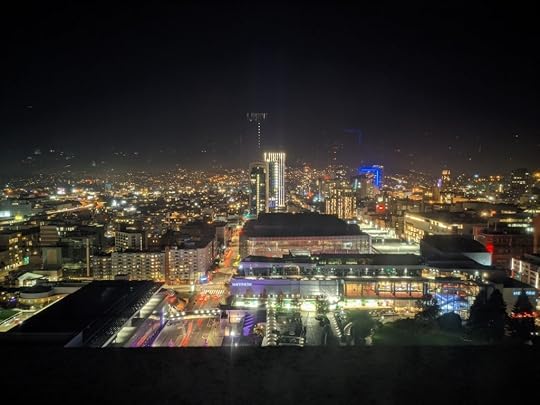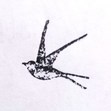Hûw Steer's Blog, page 23
December 26, 2021
Merry Christmas
I won’t make you read much today, as the festive weekend is in full swing and I have a significant amount of turkey still to consume, as I’m sure is the case for many of you.
I shall simply with you all a merry Christmas (or equivalent winter celebration), and hope that you are all furnished with plenty of food and drink and new objects to occupy your time. Maybe some new books. (Maybe this new book?)
Now if you’ll excuse me I have boxes (or boxing?) that requires my attention before the rest of my family arrives.
December 20, 2021
It’s Out
I could have done a countdown, but why bother?
Nightingale’s Sword is now available – in ebook and paperback form. (US links, but it’s available in all markets!)
Get it while it’s fresh. Not that it’s going to go off.
And if you haven’t read The Blackbird and the Ghost yet, don’t worry – it’s free from today until Christmas Eve.
I hope you enjoy reading it as much as I enjoyed writing it.

December 11, 2021
Nightingale’s Sword – Sneak Preview
Preparations continue to be made for the release of Nightingale’s Sword (either next week or early the week after). But while you wait, why not reread The Blackbird and the Ghost so you know what’s going on – or read it for the first time if you haven’t already?
Because the (ebook version of) The Blackbird and the Ghost now features a little surprise: an extract from the beginning of Nightingale’s Sword, all shiny and new! Have a read all the way to the end to get a teaser of what’s coming in book 2.
Even if you already own the book, I believe that you can download an updated version from the ‘Manage My Content and Devices’ page on Amazon. Or it’ll do it automatically. Not entirely sure. Either way, all your ebooks, whether brand new or not, should now feature the new extract at the end.
I’m excited. I hope some of you are too.
December 5, 2021
Fresh Inspiration
It’s been a while since I tried writing something cyberpunk or cyberpunk-adjacent. But when you go away for a work trip and this is the view from your hotel window…

If only I’d been able to pick up Gibson’s Zero History and there was a new Matrix film on the horizon to get me properly in the mood.
Yeah. I can taste the neon and smell the code. Once Nightingale’s Sword is out, I think I’ll give fantasy a rest for a little while and get stuck into something high-tech and low-life.
November 28, 2021
The Boiling Seas: The Story So Far
I’m in the US at the moment so time is weird – apologies.
The sequel to The Blackbird and the Ghost is coming in a few weeks – so I figured it might be a good opportunity to recap on what’s happened in the world of the Boiling Seas so far.
Obviously, spoilers follow for The Blackbird and the Ghost. If you haven’t read it, you might like to.

Tal Wenlock: adventurer, thief, and archaeologist, depending on who you speak to. A renowned treasure-hunter, he takes to the Boiling Seas to hunt for an ancient scroll of healing magic – one of five created long ago by an unknown but incredibly powerful wizard, long lost to myth. While the scroll is immensely valuable, if it exists, Tal isn’t in it for the money. He wants it to cure the incurable disease that has crippled his sister for years.
The Boiling Seas are a dangerous place, of course. Volcanic activity on the ocean floor has made them permanently boiling hot. Only the hardiest serpents and metal-scaled fish can survive in their depths, and a wooden boat will not last long. Great steel-hulled ships and airships are the only ways to cross the steaming waters – and it is on the former that Tal pursues a lead to the city of Port Malice on the Corpus Isles.
Into the earth Tal goes: deep into the furthest reaches of an old mine, following clues from an ancient journal to find the buried remnants of an ancient palace. But he doesn’t find the scroll there. Instead he finds the agents of his bitterest enemy: another treasure-hunter, a man without moral or scruple, a man purely after profit and prepared to do anything to get it. Mikhail Siras, the Ghost, the Nowhere Man. Tal flees into the tunnels, is shot, and very nearly dies beneath the ground.
Instead, however, he is rescued by the scholars of the Lantern, a great university of every subject under the sun – and magic too. There he meets Maximillian Odyn, a young scholar who he persuades to join him on his quest. With her mastery of magic and deep knowledge of ancient languages and history, Max is able to help Tal figure out the real location of the scroll.
Together, they sail out to the tiny island of the Palm, and in its caverns they find the resting-place of the scroll – at the heart of a forgotten tomb packed with traps and tricks for the unwary. Those Tal can handle – but not the Nowhere Man, who very nearly kills him with the scroll already in his hands. But with Max’s help, the Ghost is defeated – and with the scroll of healing, Tal is saved.
The pair head for the mainland to tend to Tal’s sister – and from there, to the next of the five scrolls. And if I said anything else, I’d be giving you spoilers.
Nightingale’s Sword will tell you what happens next.
November 21, 2021
ANNOUNCEMENT: The Boiling Seas… Book 2
In the endless jungles of Tyria, the Blackbird flies again.
 Cover by me, from a stock photo by Quang Nyugen Vinh
Cover by me, from a stock photo by Quang Nyugen VinhTal Wenlock and Max Odyn make a formidable team. The thief and the scholar have already unearthed one ancient scroll, filled with priceless knowledge and forgotten magic – and with it cured Tal’s sister of her crippling illness.
But four more scrolls still lurk in long-forgotten tombs – and Tal and Max are determined to find them. Unfortunately, so is everyone else. Tal and Max will have to race the world’s finest treasure-hunters across the deadly Boiling Seas, from the depths of the earth to the heights of the sky, if they want to win the glory – and the gold.
Thankfully, this time Tal and Max have help. Because Lily Wenlock is back on her feet – and she’s not about to let her little brother have all the fun.
The jungle islands of Tyria hold secrets unimaginable – all the Blackbird and his friends have to do is find them first.
It’s written. For the second time. I’ve still got some tweaking to do, but my elite cadre of proofreaders are hard at work finding all the inevitable typos. That just leaves some tedious formatting for the paperback version (and possibly the hardback, because KDP does that now) – and that should be that.
The second book in the Boiling Seas trilogy will be out before Christmas.
Feels a bit weird to say that. But it’s happening. Watch this space.
November 7, 2021
What do you mean, all the Alex Rider books take place in the span of a single year?
Boiling Seas 2 announcements are being prepared as I sort out artwork/proofing/some level of publicity. Stay tuned. For now, have a review-like ramble, and be warned for (very light) spoilers for the newer Alex Rider books.
I’ve always liked spy stories. When I was a kid I practically wore out our VHSes of From Russia With Love and Octopussy (the only Bond films we had at the time, which explains why I still have a soft spot for the Roger Moore era, campy as it is).
And I read the Alex Rider books dozens of times over. A teenage Bond was exactly what I wanted, and I devoured the original 6 books. The next 3 (Snakehead through Scorpia Rising) I still enjoyed, but I was growing up a little by then, and though they did get darker to match my ageing they didn’t quite hit the spot in the same way those first 6 did. But I still loved them. I even watched the film, though somehow I still haven’t watched the TV show. It was never going to win any Oscars but on the scale of children’s books adapted into movies, it’s definitely closer to Narnia than Eragon.
 The original and best cover artwork. Alas, my Eagle Strike doesn’t match the rest of the six…
The original and best cover artwork. Alas, my Eagle Strike doesn’t match the rest of the six…Horowitz can really write a spy story. He can write a James Bond story too – I read his Forever and a Day recently as well, and it’s a fantastic Bond book. Without wishing to offend Charlie Higson, Alex Rider was always much better than the Young Bond series.
Then recently I found out that Horowitz had picked up the series again after a 6-year break. I managed to find a copy of Never Say Die at my library, and I eagerly dove back into the world of Horowitz’s teenage spy. What stories will he tell now he’s a young adult? I thought to myself as I opened the book. It had been so long, I was looking forward to seeing Alex Rider mature.
And then I realised that, contrary to my memory of the series, all nine of the preceding books had taken place while Alex was still 14 years old.
My mind was boggled. This kid had fought international assassins, stopped a nuclear war, brought down media moguls, beaten up his own evil twin and been to space in the space of one year. I genuinely thought that each book had taken place months apart – in my head, Alex had been about 12 at the start but had finished the original run aged about 17. (I realise now that I’d been mixing him up with Artemis Fowl, who does, rather more sensibly in my opinion, age as the series goes on.)
Never Say Die opens with Alex aged 15. He’s still a kid. A highly traumatised kid, but a kid nonetheless. I started the newer books with a healthy level of scepticism – but in fairness to Horowitz, he makes it work. Alex Rider has always been a reluctant agent of MI6, but in Never Say Die, Secret Weapon and now Nightshade, Horowitz really plays up the angle that he doesn’t want to do this. He’s done with getting shot and stabbed and burned. He’s a teenager who wants to live his life, and the fact that he’s failing miserably in school (which makes much more sense given that he’s skipped the best part of a whole year rather than the few weeks at a time that I thought he’d missed) doesn’t help either.
But Nightshade is a different story. For the first time Alex is confronted by what he could have become, in the shape of brainwashed child assassins – better trained than him but utterly lacking conscience. It’s a theme that Scorpia began to touch on, but only for Alex himself, and he was able to resist that reprogramming. But when faced with a glimpse of what MI6 could have turned him into if they’d had fewer morals, Alex reassesses what he’s been through. It’s a really effective way of giving the series a fresh angle on the life of a teenage spy. For the first time, Alex wants to stop these people – not just because they’re threatening the world but because he genuinely thinks them evil.
In short, if you ever enjoyed Alex Rider as a kid, pick up the newer books. Despite the fact that I’m a decade older, I’m enjoying them just as much as I ever did.
October 31, 2021
I Did It
This post comes late today, because I spent all day finishing the V2 edit of Boiling Seas book 2.
It’s got a title now and everything.
Proofreading to do and stuff to organise, but more news very, very soon.
October 24, 2021
An Experiment, Part 6 – The Chase
With ambiguous votes clarified, ‘run’ is the winning option.
You turn and run for it – towards the bandits, because there is nowhere else to go save into the cave or the fire. It is the only thing that saves your life. The bandit with the crossbow had a perfect shot on you, but you are suddenly inside his guard too quickly for him to drop his aim enough, and the bolt that would have punched you off your feet instead clips the top of your shoulder as you barge between the trio of bandits and sprint away into the dark woods.
There is still a hot line of pain across your shoulder, though – your sword-arm, such as it is. The heavy, blunt sword feels very heavy indeed now, but you cling to it, just in case, as you crash through the trees, all thoughts of stealth entirely forgotten. Roots snatch at your feet, branches whip at your face.
And behind you you hear the shouts of the bandits as they give chase, making even more noise besides.
Another crossbow bolt whips through the forest just inches from the back of your head. They are clearly not especially interested in taking you alive. You think you can hear the bandit who led you into the trap shouting among them, exhorting his comrades on. You hope that the bandit from the inn was beaten by its keeper. If you knew where you were going you could try to run back for the cover of the inn – but you ran in the first direction you could and have no idea where you are in the forest now. The warm glow of the inn’s light is certainly absent. But it is so dark, so cloying, that the inn could be just feet from you and you would have no idea.
All you can do is run, and run, and hope that the bandits will give up chase before you run headlong into a great tree or fall from a cliff-edge. But they show no sign of giving up, and the crossbowman is still loosing the odd bolt at you. One punches into a nearby tree and you flinch aside and almost trip over, your feet tangling themselves. Then you hit a root, and you do fall, tumbling down a short slope before managing to regain your footing.
There is a new noise here. You stay still for a moment, listening, hearing the bandits at your back shouting to one another, wondering where you have gone. You listen, and you realise what the new noise is.
You had forgotten about the river. It is there, right there, gleaming in what little moonlight can reach it. You almost rolled straight into it. It surges, swelled with recent rain.
And, tied there at a tiny jetty barely worth of description, is an equally tiny boat. It has no oars, no sail, but it floats.
“There!” you hear a shout, and you see torchlight, hear pounding feet and shattering undergrowth, and then the light of fire on steel.
You have no choice.
As another crossbow bolt flashes from the gloom and embeds itself in the wood of the jetty, you hurl yourself into the little boat, hack at its rope with your stolen knife, and as the first bandits pile onto the jetty you break through, and the current takes you. One last bolt flashes over your head as you cringe in the bottom of the boat – but then the river has you.
You lie there in the bottom of the boat. You are tired, you are wounded, you are bewildered – but you are alive. You let the river whisk you away into the night, towards what dawn you do not know.
dundundurr.mp3
As you may have gathered from this thrilling cliffhanger, this story isn’t over yet. But I’m going to take a break for a few weeks before carrying on – I want to have a think about where we’re going next and how to get there (in many different branching ways, of course).
Thank you to everyone who took part in this. You will reach Whetstone. Or at least you’ll have the chance to, if you want. Stay tuned for your second chance to do so.
October 17, 2021
An Experiment, Part 5 – The Camp
Unanimous votes to go to the camp – so here we go.
The bandit has a torch; a flimsy, guttering thing that half-splintered in your struggle. It is barely enough to light the way, most of its weak flame being absorbed by the cloying trees, but it is just sufficient. You walk behind the battered bandit, the blunt point of your sword pressed into the small of his back. He knows now that it is blunt, having had it up against his throat – but he also knows that his own knife, which you now carry in your offhand, is very sharp indeed.
You feel a little guilty for abandoning the inn to its fate, but you console yourself with the fact that the innkeeper looked extremely capable, and that the unconscious patron was at least still breathing. Besides, if this man does have anything worth taking, you can always return to the inn in the morning and share out your new gains. The truth is that you need money, and need it badly. Weeks of travel have almost emptied your purse, and it was not especially full to begin with. With some gold in your pocket you could buy a horse at Whetstone, or hitch a ride with a trade caravan, or even on a riverboat. Its gleam is that of possibility, in your mind’s eye.
“Little further,” the bandit hisses when you jab him lightly in the back. He is wise to be quiet. The forest is far from uninhabited, and you are two people alone in the dark, blunt sword notwithstanding.
It is indeed a little further. The bandit gingerly pushes some of the undergrowth aside, and reveals a clearing at the mouth of a cave, the remnants of an old campfire glowing gently on the ground. The bandit steps out into the clearing, hands raised slightly so you can be sure that he remains unarmed.
“Loot’s just inside,” he says. “You can watch me from out here. Not going anywhere. Swear it.”
Reluctantly you agree, and, with the torch in hand, the bandit steps inside the cave. The light keeps him visible, and, true to his word, he awkwardly picks up a metal strongbox and carries it out into the firelight.
“Here,” he says. “Take your share. Then you can go back to your pub and pretend I got away. Nobody’s any the wiser. Savvy?” You nod slowly, aware that the bandit is getting the best out of this deal in many ways: he escapes, largely unhurt, and with all the loot, instead of just a third of it. But when he opens the lid of the strongbox and reveals the gleaming coin and stolen jewellery that fill it almost to the brim, thoughts of anything save the money leave your mind entirely.
You reach out for the box, fingers closing around the first coin – and then you hear the creak of a drawn bowstring, and a voice saying, “Leave it.”
You turn, to see three more bandits standing behind you – not the ones from the inn, but a fresh trio, all armed and all looking very unhappy. One has a crossbow, pointed right at you. You realise now what made you nervous before: the cave, the campfire, the sheer amount of loot – all were far too large for just three people. And the bandit you fought, who steps around to join his friends with a cruel smile on his face, didn’t even break his word. He brought you here. You have only yourself to blame for assuming there would be nobody else there.
You could run. Dodge the first arrow and you could be away before the second is loosed. You could even try to fight, again assuming you’re not shot – you have a proper blade now as well as your blunt sword. Or you could surrender, and hope that you are considered worth some sort of ransom, instead of just a slit throat.
What do you do?
Whoever said this was a bad idea… yeah. Votes below.



